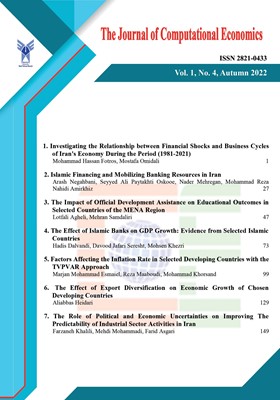Islamic financing and mobilizing banking resources in Iran
Subject Areas : Computational economics
seyyed ali paytakhti oskooe
1
![]() ,
Arash Negahbani
2
,
Nader Mehregan
3
,
Arash Negahbani
2
,
Nader Mehregan
3
![]() ,
Mohammadreza Nahidi Amirkhiz
4
,
Mohammadreza Nahidi Amirkhiz
4
1 - Department of Economics, Tabriz Branch, Islamic Azad University, Tabriz, Iran
2 - Department of Economics, Tabriz Branch, Islamic Azad University, Tabriz, Iran
3 - Department of Economics, Faculty of Economics and Social Sciences, Bu Ali Sina
4 - Department of Economics, Economics-Management and Accounting Faculty, Islamic Azad university , Tabriz Branch, Tabriz, Iran
Keywords: Islamic financing, , , , Banking, , Sukuk, , Markov switching,
Abstract :
One of the most important functions of the Islamic financial system is to facilitate financial flow and divert financial resources for productive investment projects. This system gives banks the opportunity to move economic resources more quickly and accurately, relying on monetary and financial resources, and the existence of Islamic financial instruments increases the productivity and optimal mobilization of banks' resources. In the present study, using Markov switching econometric technique the effect of Islamic financing (through rent sukuk and Murabaha bonds) on mobilizing banking resources in Iran has been investigated during the period 2012:4 to 2021:2 (based on quarterly data). The findings show that sukuk bonds in both regimes have a positive effect on bank deposits. In other words, the expansion of the sukuk has led to growth bank deposits. Therfore, we must look for ways to attract foreign and domestic investment in order to issue different types of sukuk. The use of these assets increases the resources of the banks.
_||_


